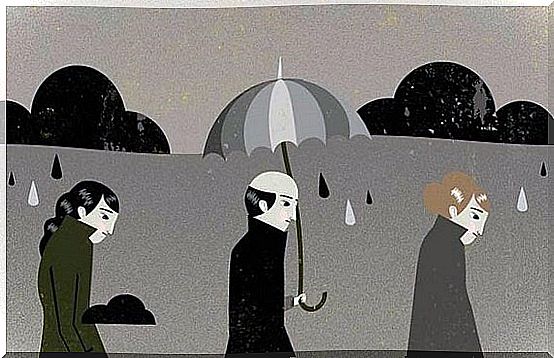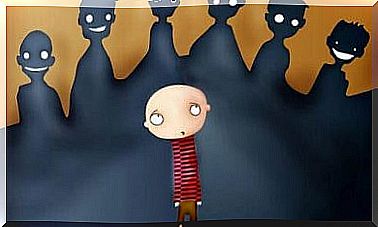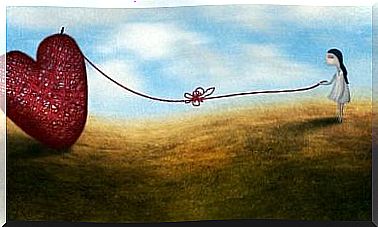The Symptoms Of Depression: Tendencies You Must Not Miss

The symptoms of depression are as diverse as they are individual to each person. But they all share a dark reality: chronic pessimism and an inability to keep up with life. It is a completely paralyzing disease.
Other than that, it does not care about your age, your gender or your social status. It is a disease that is unfortunately shrouded in mystery even today.
It says that the first step towards healing is to express one’s pain in words. To say where it hurts is to make a wound visible. It is being able to diagnose a trauma or an internal problem that has specific symptoms. But when it comes to depression, this is not easy.
People with depression often find it very difficult to explain exactly what hurts and in what way.
Why? Whether we are talking about dysthymia, a seasonal illness, severe depression or even bipolar disorder, sufferers often say that “everything” hurts. Their bodies, their thoughts and their lives weigh heavily on their shoulders. Everything stings and everything wears them out. With this kaleidoscope of problems, it feels impossible to clearly describe what is wrong.
Maybe that’s why so much misdiagnosis happens. It is quite common for doctors in outpatient care to only treat individual symptoms without thinking that depression may be the underlying cause.
It is also common for people (especially men) to be skeptical about asking for help. They find refuge in apathy and say it’s just stress. They’re just going through a tough time.
Detecting depression early can make treatment much more effective. This is why it is so important to learn the symptoms of depression, whether it is for oneself or for people close to one’s.

Depression manifests itself in many different ways. There are many depressive disorders, and they can be associated with other psychological factors that also require diagnosis. Everyone experiences the disease in their own way. It also means that the treatment must be tailored.
What we are talking about is a condition that will invade every part of your body. It affects the immune system, digestive system, sleep cycles, metabolism, cognitive processes, etc.
Psychiatrists also remind us that this personal situation, this condition, is not something to be ashamed of. Depression is not something you choose to suffer from. It is also not like a broken bone that you can only heal with a little rest and recovery. It is a very complex, difficult situation that involves the symptoms we are going to talk about now.
Some of the most common symptoms of depression are behavioral. Let’s take a closer look at them:
- Activities you used to enjoy are no longer of interest to you.
- Problems with managing work responsibilities.
- Things you used to do quickly now take longer. Even thinking about these happens makes you tired.
- Lack of interest in socialization.
- Hypoactivity or hyperactivity. This part is important: we often associate depression with lack of energy and low activity; but the exact opposite can also happen. There are some people who can not stay. They must constantly keep busy so as not to have to think.
- Bad mood.
- A constant feeling of frustration.
- Lack of self-confidence.
- Dark thoughts and lack of hope for the future.
- Constant pondering: the kind of thoughts that never stop. Overanalysis of things and obsession.
- A feeling of disappointment.
- Permanent sadness.
- Constant irritation and anger.

- Concentration difficulties.
- Memory loss.
- Mental fog (feeling disconnected from reality).
- Countless thoughts.
One area where the symptoms of depression can cause the most problems is the physical. These are the symptoms that can lead to people seeking outpatient care. This is where doctors need help to look beyond the symptoms. If they do, they can see that depression is a possible cause.
- Headache.
- Muscle pain and cramps.
- Intestinal problems.
- Weight loss or weight gain.
- Hair loss.
- Sleeping problems.
- Fatigue.
- Skin problems.
- Weak immune system.
One of the symptoms of depression that deserves the most attention is suicidal thoughts. They start as random thoughts every now and then. But sometimes they become permanent and can lead to actual suicide attempts.
That is why it is so important to keep an eye on internal dialogue that is similar to the following:
- “If I just disappeared, everything would be fine.”
- “Hopefully I won’t wake up again if I fall asleep.”
- “Everyone would be better off without me.”
- “No one would even notice if I was gone.”
Now is a good time to point out again that the symptoms of depression vary greatly. A person’s age can also play a role.

Depression in children
- Loss of interest in playing.
- Nightmares and sleep problems.
- Lack of appetite.
- Refusing to go to school.
- Inhibited or disturbed psychomotor activity.
- Drawings of negative or aggressive things.
- Self-harming behavior.
Depression in teens
- Irritability.
- Mood swings.
- Low self-esteem.
- A need to be alone.
- Self-harming behavior.
- Fatigue.
- Constant illness: fever, cold, nausea, vomiting…
- Poor performance in school.
- Isolation and refusal to socialize.
Depression in the elderly
- Bad mood.
- Lack of appetite.
- Inactivity and fatigue.
- Digestive problems.
- Drowsiness.
- Memory loss.

As you can see, the symptoms can vary, but there are many in common. It is an exhausting spiral of pessimism and lack of energy. But there is one more thing you must not forget. If you ponder what depression does to you and what it takes away from you, you will feel that you have even less control.
You need to change your mindset and move forward. Even if you feel like you are groping in the dark with this disease, always remember that it can be treated. You can take control of it, take away its power and leave it behind.
You just have to take one step, the bravest of them all: to ask for help and indulge in yourself.








